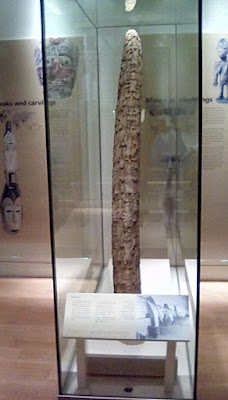This week I met Debbie the Primary Co-ordinator in the Education Department at Manchester Museum and had a chat about the project. Debbie's going to be working with me for the next few weeks. One of the things we talked about was how our perceptions of things shifted depending on what we brought to the experience. In this way a museum was like a work of art. Debbie also wondered if we could use music to influence a child's experience of a museum.
The first job was to go round the 12 key objects I chose last week and answer my own questions, which you might remember from last week were;
- What do we say about the object?
- What does the object say about itself?
- What does it really mean?
This was fun! I didn't think too much about it. I just wrote down the first things that occurred to me. I have tweeted four of them which were short enough - this might be a nice way for visitors and school children to engage.
Here they are:
Maharajah: walked 200 miles from Edinburgh to Belle Vue zoo in 1872
Look at my huge feet, how easily they carry my weight.
It was a long way. It has been a long time.
Spice Racks: India 1865, wood
I have treasures. I have secrets.
Spin me fast enough and my pods pop off, fizz like stars.
Bark Cloth: made of beaten Masi stems, stencilled, Fiji, before 1942
Roll me out. I will hold your nights and your days, your lives and your children.
I will whisper to you in my patterns, sing the wind in the Masi.
Chinese Dish, Porcelain and enamel, decorated with bats and long life symbols, for export
Sprinkle me with leaves, lay me with fruit.
I am yellow like the sun. I came across the miles. I was always here.
Helmet: metal, Iran, donated 1946
I was Persia, the Orient, Asia Minor.
I was war, death, dignity, defence.
Head-dress: Manchu, China, Kingfisher feather, bamboo, silk, more than 60 years old.
I know your greatness. I will make you great in the eyes of the world.
I am pain - the kingfisher, the oyster, the silkworm, the hands that cut. Did you think it could be otherwise?
Iron Core of Meteorite: Campo del Cielo (Field of Heaven) Argentina, 16th Century.
I am alien. I am earth.
We are all spacedust.
Jaw: Hammerhead Shark
It was only ever hunger, life.
When there were nerves, this mouth knew the whole world which spewed into it.
Cabinet of Tiny Fossils: 19th Century Collection
I am the deep history of the earth. Collected, ordered, classified.
The earth resists this project. It flirts with chaos, comes back to us giggling with surprises.
Plaster Cast of Dog buried in Ash: Vesuvious, Italy
I am every dog, scratching his back. I didn't see it coming.
I might have followed you, begged for scraps, licked your face. I have smelly breath.
Green Tree Python: Modified muscles, prehensile tail, climbs trees, sleeps during the day, head tucked in the middle of its coils, bites, Australian rain forest.
This is my tree. I have not moved all week.
I am more threatened than threatening. Let me sleep.
Fragments of Pottery: Archaeological interpretation and analysis.
Each one of us was part of something, a jar, a dish, a cup.
Our mismatched fragments become a new whole.
Frog and duck weights: Mesopotamia, 2-3rd Millenia BC
The balance, the baking, the baggies. I am your history too.
How might it be not to apportion - mass, time, value, love?
I realised I had not given much thought to the themes of water and migration during this. So I've picked two ideas to think about this week - trade and poisoned and polluted water.





























